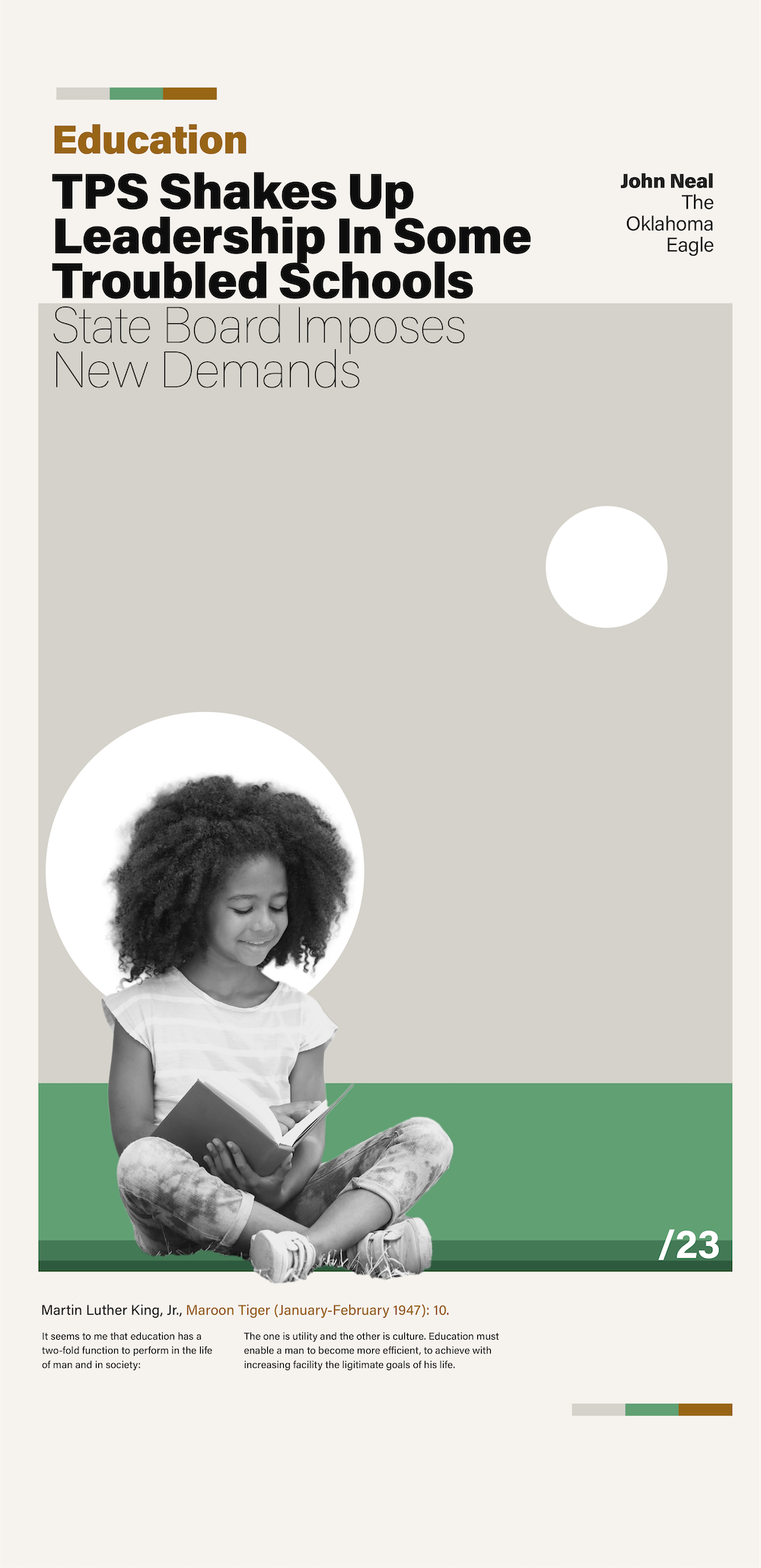
EDUCATION
State Board Imposes New Demands
John Neal
Featured Image. The Oklahoma Eagle
Tulsa Public Schools Superintendent Dr. Ebony Johnson has stepped up her bid to address widespread learning deficiencies and other pressing issues in the district by shaking up the leadership at some of the lowest-performing schools in the city. The shake-ups appear targeted at schools where student performance is lowest. The most challenged have heavy majority Black and brown student populations. Johnson has also discussed the possible closing of some schools.
Johnson’s moves come on the heels of the Oklahoma State Board of Education (OSBE) placing a new round of requirements on TPS to meet performance goals. Oklahoma State Superintendent of Public Instruction Ryan Walters, who has been sharply critical of TPS, spearheaded the tighter demands.
Johnson, who was promoted from interim to the permanent position of superintendent in mid-December, announced last week that Mollie Miller will shift from her current position of principal at Kerr Elementary School to become the dean of students at John Hope Franklin Elementary School. Miller, a veteran educator, will join a faculty where most of the teachers are relatively new to the teaching profession, by the account of leaders at Franklin.
TPS also announced that Alexa Markarian would become acting principal at McClure. She has been the assistant principal at McClure for the past three years.
TPS officials told The Oklahoma Eagle that Memorial High School and Kerr Elementary will also get new principals. The appointments are still pending. Located in south Tulsa, Memorial’s student body is 31.5 percent LatinX, 31 percent Black and 20.5 percent white.
According to OSDE statistics, Memorial placed in the bottom 50% of all schools in Oklahoma for overall test scores.
The percentage of students achieving proficiency in math was 6-9, compared to the state average of 24 percent.
The U.S. Department of Education designated north Tulsa-based Franklin Elementary and south Tulsa-based Kerr Elementary and Memorial High School for the Comprehensive Support and Improvement list.
The CSI citing is given to schools that score in the bottom five percent of all Oklahoma schools in at least one of the measures pinpointed by the state report card.
Franklin’s student body is 41.4 percent Black and 19.2 percent Latin. Kerr’s students are 51.9 percent Black and 12 percent Latinx.
McClure is on the OSDE’s tally of schools needing “more rigorous intervention” or MRI. The designation was given to schools that scored in the lowest five percent of all indicators. By OSDE’s account, 65 percent of schools in the Tulsa district received an F on state report cards and considered needing MRI. McClure’s student body is 44.9 percent Black and 20.3 percent Latinx.
The mid-term changes in school leadership, rare in TPS, reflect Johnson’s position, expressed in various public settings, that TPS’s issues must be addressed urgently.
State Superintendent Walters continues to seek to assert authority over the direction of TPS. In a Nov. 30 meeting of OSBE, Walters told members they lacked the power to impose “academic standards” on Oklahoma schools without additional rule-making. The board proceeded to set new academic standards for Tulsa Public Schools in the meeting. The action caught local school officials off guard.
The move by the state board followed TPS’s third consecutive update to the board as a condition of the Tulsa school district’s accreditation renewal in August. Walters announced the new “board order that you all have in your packets there” without informing the TPS delegation or the public before the board approved the order.
In response, TPS Superintendent Johnson said that the progress TPS had made in 2023 on the Oklahoma State Report Card amounted to more than what was needed to prevent the OSBE from burdening the Tulsa district with additional requirements.
Todd Lofton, deputy superintendent of Special Education Services at OSBE, criticized TPS for not developing a restructuring plan for school closings.

Superintendent’s report
Superintendent Johnson used the meeting to provide the state board with an update on “academic corrective action and financial transparency” measures the school district is undertaking. Johnson cited information from the recently released State Report Card documenting that nine schools in TPS increased a letter grade in State testing, and seven of 22 schools scored above the “F” grade designation from the previous year. The superintendent’s presentation addressed board concerns about “failing schools” in the Tulsa school district. Tulsa Schools’ Chief Financial Officer, Jorge Robles, followed Johnson with additional information the state board had sought on changes to increase TPS financial transparency and accountability.
Johnson’s one-hour presentation included “action steps, new initiatives, metrics, and researched-based strategies and monitoring implementation” that the district uses to increase student and school performance. She also shared personnel changes being made at district offices “to bring about necessary changes in district and school culture and performance.”
Johnson also discussed the possibility of school closures or consolidations to address low-performing school sites. The OSDE staff had asked the superintendent to begin this process and develop a school “restructuring plan.”
New requirements
In general, the state board initially reacted favorably to the TPS report. But the OSDE staff immediately followed Johnson’s appearance with its report, which was sharply critical of TPS’s performance.
Lofton told the board that TPS had not been sufficiently “ambitious” in its goal setting to address student learning and teacher training. Lofton also complained that TPS was slow to identify “which schools should be closed” and needed to “move from consideration to action.”
OSDE attorney Brian Cleveland followed Lofton, criticizing TPS’s lack of transparency in financial reporting, notably its recording of “miscellaneous services and expenses.” Cleveland said his finance team had been frustrated with TPS accounting personnel.
Acting on a new set of “OSDE Recommended Goals,” the state board, at the urging of Superintendent Walters, passed a series of “Board Orders” that Walters had prepared. They are the following:
- Fifty percent of TPS students must score “basic” or above on state reading tests or increase progress toward that benchmark by 5 percent.
- All teachers and school administrators will complete an OSDE-approved “science of reading” course.
- At least 12 of the 18 schools who scored “F’ on a previous state evaluation must improve their grade.
- TPS finance staff will be required to meet with OSDE on or before Dec. 8, 2023, to review concerns the department has with TPS financial reports.
Tulsa Public Schools must accomplish these new requirements as “accreditation standards” for the 2022-23 school year and provide monthly updates to the board on its progress.
Board authority
Earlier in the meeting, under a non-action agenda item titled “information from the State Superintendent,” Walters informed the board that they needed to adopt “new administrative rules” to require Oklahoma schools to have “academic standards” as accreditation requirements. Walters told the board the following:
“Currently, for the State of Oklahoma, we do not have anything academic by our standards. So, to meet that requirement…we will be preparing a new rule that would require districts to meet a certain threshold of academic performance. And if they don’t meet that threshold, they would get a deficiency, and we would start penalizing them through the accreditation process.”
Walters described the process that requires public input [and hearings] and “would be a few months down the road” before it could be brought to a board vote. The state superintendent described the proposed draft of one rule similar to one they would later in the meeting impose on TPS without any administrative rule changes.
All executive state agencies are required by state law to go through this process of adopting new administrative rules in order, in part, to prevent the agency or its board from acting arbitrarily or beyond the scope of its authority. Neither Walters nor anyone in his department explained how the agency’s board could impose these “orders” on TPS’s accreditation without a change in administrative rules.
Additionally, on April 4, 2023, the Oklahoma State Attorney General Gentner Drummond invalidated new rules the OSBE had “adopted” using the authority and process the state superintendent described the board should use to impose academic standards on Oklahoma schools. In a formal opinion, Drummond said Oklahoma law precluded the OSBE from making new administrative rules without the “specific grant of authority” from the legislature.
Drummond wrote, “It is well settled that an agency may only exercise the powers expressly given by statute. An agency cannot expand those powers by its own authority.”
TPS accepts changes
Superintendent Johnson told the OSBE at their Dec. 21 meeting that TPS would accept the new goals. Johnson said the district’s “current progress toward goals” and “implementation of improvement efforts at targeted schools” made the new goals achievable. Johnson reported that the new academic standard would necessitate moving approximately 700 of 6,200 students from “below basic into a higher-performance band.”
Johnson also told state board members that reducing the number of failing schools has become achievable because “we saw strong evidence of growth across report card indicators.” This included nine schools increasing a letter grade on the state report card in 2022-23 and four moving out of chronic failure status as of Dec. 19.
In a prepared presentation to the state board, Johnson agreed to increase the “science of reading” training to 100 percent of school faculty and to be more responsive to OSDE concerns regarding financial reporting. Further, the superintendent added that TPS would realign “district goals to match OSDE goals.”
The day following Johnson’s presentation, before the board agreed to the changes, Walters posted a video on X, formerly Twitter, saying, “Dr. Ebony Johnson laid out a tremendous plan for the future of Tulsa. It’s all the things I have been asking for.”









